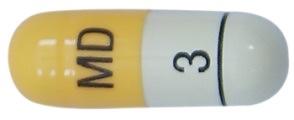Dofetilide Dosage
Medically reviewed by Drugs.com. Last updated on Apr 3, 2025.
Applies to the following strengths: 125 mcg; 250 mcg; 500 mcg
Usual Adult Dose for:
Additional dosage information:
Usual Adult Dose for Arrhythmias
Corrected QT interval (QTc) and CrCl must be determined prior to the first dose. If heart rate is less than 60 beats per minute (bpm), QT interval should be used instead of QTc. Patients with heart rates less than 50 bpm have not been studied. CrCl must be calculated via the Cockcroft-Gault equation (using actual body weight).
If QTc is less than or equal to 440 msec (500 msec in patients with ventricular conduction abnormalities): CrCl should be used to determine first dose
If QTc is greater than 440 msec (500 msec in patients with ventricular conduction abnormalities): Use is contraindicated
First Dose:
- CrCl greater than 60 mL/min: 500 mcg orally twice a day
- CrCl 40 to 60 mL/min: 250 mcg orally twice a day
- CrCl 20 to less than 40 mL/min: 125 mcg orally twice a day
- CrCl less than 20 mL/min: Contraindicated
Second Dose: Determine QTc 2 to 3 hours after administering the first dose.
If QTc increased by 15% or less compared to baseline: Continue previous dose
If QTc increased by more than 15% compared to baseline, or if QTc is greater than 500 msec (550 msec in patients with ventricular conduction abnormalities), then decrease dose as follows:
- If first dose was 500 mcg twice a day, then use 250 mcg orally twice a day
- If first dose was 250 mcg twice a day, then use 125 mcg orally twice a day
- If first dose was 125 mcg twice a day, then use 125 mcg orally once a day
Subsequent Doses: Determine QTc 2 to 3 hours after administering each dose.
No further down-titration based on QTc is recommended.
If QTc is greater than 500 msec (550 msec in patients with ventricular conduction abnormalities) at any time after the second dose, this drug should be discontinued.
Comments:
- A physician may choose a dose lower than determined by the algorithm, and if this lower dose is subsequently increased, the patient needs to be rehospitalized for 3 days. Previous toleration of higher doses does not eliminate the need for rehospitalization.
- If patients do not convert to normal sinus rhythm within 24 hours of initiating this drug, electrical conversion should be considered.
Uses:
- Maintenance of normal sinus rhythm (delay in time to recurrence of atrial fibrillation/flutter) in patients who have had atrial fibrillation/flutter for more than one week and have been converted to normal sinus rhythm. This drug should be reserved for highly symptomatic atrial fibrillation/flutter.
- Conversion of atrial fibrillation and atrial flutter to normal sinus rhythm.
Renal Dose Adjustments
CrCl greater than 60 mL/min: 500 mcg orally twice a day
CrCl 40 to 60 mL/min: 250 mcg orally twice a day
CrCl 20 to less than 40 mL/min: 125 mcg orally twice a day
CrCl less than 20 mL/min: Contraindicated
Liver Dose Adjustments
Mild to moderate liver dysfunction: No adjustment recommended.
Severe liver dysfunction: Use with caution.
Precautions
US BOXED WARNING:
- ARRHYTHMIA: To minimize the risk of induced arrhythmia, patients initiated or reinitiated on this drug should be placed for a minimum of 3 days in a facility that can provide calculations of CrCl, continuous electrocardiographic monitoring, and cardiac resuscitation.
CONTRAINDICATIONS:
- Hypersensitivity to the active component
- Congenital or acquired long QT syndromes
- Baseline QT interval or QTc greater than 440 msec (500 msec in patients with ventricular conduction abnormalities)
- Severe renal impairment (CrCl less than 20 mL/min)
- Concomitant use of cimetidine, dolutegravir, hydrochlorothiazide (alone or in combinations), ketoconazole, megestrol, prochlorperazine, trimethoprim (alone or in combination with sulfamethoxazole), or verapamil
Safety and efficacy have not been established in patients younger than 18 years.
Consult WARNINGS section for additional precautions.
Dialysis
No data available
Other Comments
Administration advice:
- This drug should only be initiated (and if necessary, reinitiated) in a setting that provides continuous ECG monitoring and personnel trained in the management of serious ventricular arrhythmias.
- If a dose is missed, the next dose should be taken at the usual time and not doubled.
Monitoring:
- Cardiovascular: ECG (continuous for at least 3 days, or for a minimum of 12 hours after electrical or pharmacological conversion to normal sinus rhythm, whichever is greater); QT interval (prior to first dose, 2 to 3 hours after each dose, and every 3 months or as medically warranted)
- Metabolic: Serum potassium (should be within normal range before and during treatment with this drug)
- Renal: Renal function (prior to first dose and every 3 months or as medically warranted)
Patient advice: Advise patients to immediately report any symptoms that may be associated with electrolyte imbalance (e.g., excessive or prolonged diarrhea, sweating, vomiting, loss of appetite or thirst) to their healthcare provider.
More about dofetilide
- Check interactions
- Compare alternatives
- Pricing & coupons
- Reviews (78)
- Drug images
- Side effects
- During pregnancy
- Drug class: group III antiarrhythmics
- En español
Patient resources
Other brands
Professional resources
Other brands
Related treatment guides
See also:
Further information
Always consult your healthcare provider to ensure the information displayed on this page applies to your personal circumstances.


